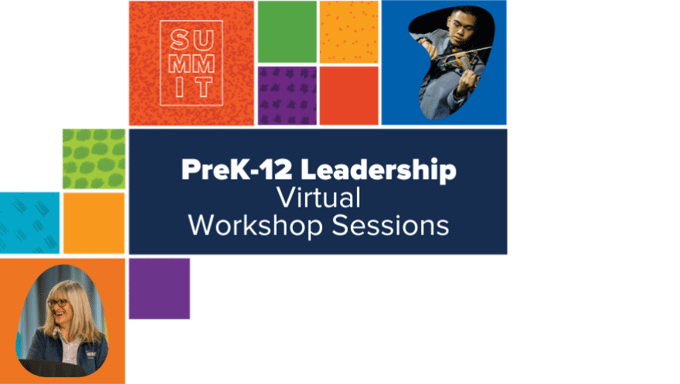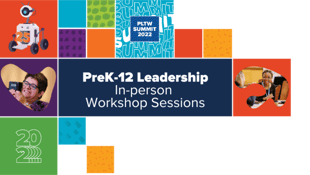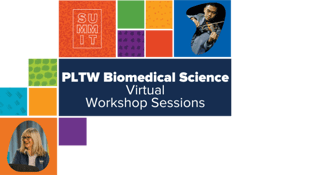PLTW Summit 2022 is available online for the first time! With workshop sessions to empower you with the tools and tips to maximize your time and enhance the learning experience for your students and opportunities to connect with industry leaders this is sure to be a critical stop on your professional development roadmap for the 2022-23 school year. See below for a first look at the sessions featured in our virtual PreK-12 Leadership track, and head over to pltw.org/summit to add sessions to your PLTW Summit agenda!
Amazing Team Effort to Create Pathways for Biomedical Science, Healthcare, and Biotech Careers
Katrina Rogers, Tamara Mandell, and Diane Lashinsky
Tracks: PLTW Biomedical Science, PreK-12 Leadership
See what’s possible when a committed team joins together to create real opportunities for PLTW Biomedical Science graduates right out of high school! Supported by Washington State University Health Sciences Spokane, ADD WHO harnessed Eastern Washington’s vision for the future of workforce talent to support healthcare, innovative biomedical research, biotechnology, and biomanufacturing. In this session you’ll hear from ADD about their two-year project to integrate vital elements that would provide PLTW Biomedical Science students with opportunities to engage with local biomedical science industries to launch their careers.
Participants completing the session will:
- Examine criteria for building a team to meet career launch goals for students, including educators, employers, colleges, and a respected industry-recognized credential.
- Leave understanding the importance of connecting goals to local, relevant industry needs and ensuring student access to high-demand careers.
- Leave Understanding how connecting with relevant local initiatives in your region or state focuses team effort, accelerates momentum, and supports overall success.
Creating a Near-Peer Mentoring Program with PLTW Students and Undergraduate STEM Students
Scott Troy
Track: PLTW Biomedical Science, PreK-12 Leadership
Through a collaboration between a Colorado high school PLTW program and the University of Denver, we established a focused near-peer mentoring program in which a total of 33 Denver Univeristy STEM undergraduates mentored 67 PLTW students, creating a total of 21, 35-50-minute mentoring sessions that were held throughout the academic year of 2020-21. These mentoring sessions focused on both PLTW-specific topic mentoring, as well as "soft skill" and academic process skill mentoring. This workshop introduces the design and implementation of this very successful program, as well as tips and suggestions for creating similar cooperative experiences in other schools.
Participants completing the session will:
- Identify the characteristics of a near-peer STEM mentoring program that could be replicated or adapted for success in their respective schools and PLTW programs.
- Compare and contrast the near-peer mentoring involved with PLTW-specific topic mentoring and "soft skill" or academic process skill mentoring.
- Analyze the implementation of a collaborative near-peer mentoring program between high school PLTW students and undergraduate STEM students to identify "lessons learned."
Leveraging Community Partnerships
Michael Rubin
Tracks: PLTW Computer Science, PLTW Engineering, PLTW Biomedical Science, PreK-12 Leadership
Uxbridge High School (UHS), a small, suburban, public high school in central Massachusetts, has leveraged partnerships with local industry to create authentic learning opportunities for students and curriculum support for students. In doing so, the PLTW programs at UHS have been used to model a variety of other programs across the state and region, as the school merges these partnerships with traditional content areas in an effort to reimagine what school looks like.
Participants completing the session will:
- Understand the nexus between PLTW programs and effective industry partnerships.
- Leave this presentation with a variety of practices that can be used with faculty, support staff, families, students, and community partners to help drive improvement to learning across all areas.
- See how a whole-school approach to industry partnerships has had a positive impact on the enrollment and performance in PLTW programs.
Rochester Institute of Technology PLTW Undergraduate College Credit
Deborah Cooper, George Zion, and Sarah Pillittere
Tracks: PLTW Engineering, PLTW Biomedical Science, PreK-12 Leadership
In this session, participants are given an overview of the Rochester Institute of Technology (RIT) PLTW undergraduate college credit program and participate in an in-depth discussion about the credit registration process, benefits of college credit, and the transferability of credit.
Participants completing the session will:
- Understand the RIT PLTW undergraduate college credit program including: courses, student eligibility qualifications, timeline/important dates; Benefits for students; Benefits for schools.
- Understand the credit registration process including: Teacher role and Student/parent roles.
- Allow participants to ask questions and view online registration and website, (timing allowed).
Constructing Their Future
Eryca Card, Steve Fisher, Julia Ingersoll, and Greg Ingersoll
Tracks: PLTW Gateway and PreK-12 Leadership
This workshop focuses on the importance of using community partnerships to construct the future of our PLTW students. Elkhorn Area Middle School, in partnership with Wausau Homes, Adams Electric, and the Elkhorn Kiwanis Club, discuss the partnership that was born out of Green Architecture and Energy and the Environment in PLTW Gateway, used to build a 12'x20' green outdoor education space at our school, food pantries, and a playhouse. This workshop discusses the journey that they embarked on for the past three years in partnering 6th grade students with local businesses and service organizations.
Participants completing the session will:
- Understand the importance of creating business and community partnerships to enhance your PLTW programs at the elementary, middle, and high school levels.
- Create a plan to take back to implement within your communities.
- Devise ways to come up with funding that will help enhance your PLTW program.
Creating a PLTW Implementation Plan
Jamie Mathews and Stephanie Mason
Tracks: PLTW Launch, PLTW Gateway, PLTW Computer Science, PLTW Engineering, PLTW Biomedical Science, PreK-12 Leadership
In this session, participants will learn about how the DeSoto Parish School District revamped their STEM offerings using PLTW Launch, PLTW Gateway, and PLTW High School curriculum. Investigate the strategic planning that occurs between district and school leadership teams in order to increase student access to meaningful STEM programs. The collaborative effort requires creative scheduling and staffing solutions to meet the needs of the diverse student population in the parish.
Participants completing the session will:
- Identify the unique challenges DeSoto Parish Schools faced when implementing PLTW programs in schools across a district with diverse student populations.
- Use sample plans provided to determine how to best plan for future implementation of PLTW in K-12 schools.
- Be better prepared to seek support from district leaders including your Superintendent, Human Resource Manager, STEM Coordinators, or other personnel needed to successfully implement a strong PLTW program.
Student Ideas' Matter! Linking Formative Assessment to Instructional Sequence
Patrick Brown
Tracks: PLTW Launch, PLTW Gateway, and PreK-12 Leadership
Students' Ideas Matter is a lively workshop that will inspire you to reimagine how you teach science and STEM. The session discusses how simple shifts in the way you arrange and combine activities and how you have students communicate their developing understanding will help young students construct firsthand knowledge. Constructing knowledge and sense making is precisely what is called for by modern standards and necessary to increasing STEAM and science literacy. This session gives both the rationale and the real-life examples to restructure the hands-on approaches you are now using to promote long-lasting understanding.
Participants completing the session will:
- Develop an understanding of cognitive science and science education research that explains why the order in which you structure your lessons is so critical for developing conceptual understanding and transfer learning.
- Develop knowledge of the essential planning considerations for becoming an “explore-before-explain” teacher and how to leverage the assets that all students bring to STEM to promote critical thinking and problem-solving.
- Engage in examples that show how specific aspects of all three dimensions of contemporary science and STEM are beneficial for learners.
Connecting Students to Industry: Leveraging Career-Based Learning Opportunities
Erin Dillon, Steve Peterson, Derek Read, and Keith Killebrew
Tracks: PLTW Computer Science, PLTW Engineering, PLTW Biomedical Science, PreK-12 Leadership
A panel of industry and district partners, such as those featured in PLTW impact profiles, share insights into creating and leveraging career-based learning opportunities for students. Learn how being intentional about career-based learning experiences, as well as collaboration with industry and the community can make a difference for student success.
Participants completing the session will:
- Understand how career-based learning can improve student outcomes.
- Gain strategies for creating or improving career-based learning opportunities.
Gain strategies for establishing or improving partnerships with local industry and their community to provide career-based learning opportunities for students.
Building Robust PreK-12 PLTW Pathways and Scaling Across a Metropolitan STEM Ecosystem
Martha McCabe
Tracks: PLTW Launch, PLTW Gateway, PLTW Biomedical Science, PLTW Engineering, PLTW Computer Science, PreK-12 Leadership
This session will share detailed strategies and tactics used to scale and support PLTW growth across a metropolitan STEM ecosystem since 2006. Through the support of the Kauffman Foundation and the KC STEM Alliance, a majority of the Kansas City school districts have implemented PreK-12 PLTW pathways in computer science, engineering, and biomedical science to over 90,000 students. This robust implementation model is growing next generation STEM talent critical to support a robust STEM job market in a large metropolitan city.
Participants completing the session will:
- Learn strategies and tactics successfully used to expand student access to STEM education and the importance of inclusion for all students. Gain knowledge about the power of aligned course content and skill scaffolding, and the power of connecting students to possible career opportunities.
- Understand the power of building PreK-12 STEM talent and how it can be scaled across multiple schools and districts. Learn how increased collaboration with business and industry leaders and community partners can help create robust STEM communities of practice.
- Receive the findings from a recent Missouri High School Research Study with key findings related to PLTW students and their success.
Build Thriving PLTW Programs Through Connected Communities
Glade Montgomery, Pat Barnes, Dr. George Zion, Dave Butler, and Michelle Robinson
Tracks: PLTW Launch, PLTW Gateway, PLTW Computer Science, PLTW Engineering, PLTW Biomedical Science, PreK-12 Leadership
If you’re looking to build or expand your PLTW community presence, this is the session for you! Learn about shared best practices between industry, higher education, and K-12. Hear from community experts familiar with building effective collaboration pipelines and get answers to your “how-to” questions.
Participants completing the session will:
- Know how community connections can increase the health and sustainability of your PLTW program. Connected communities are vital to the health of PLTW programs.
- Learn how to develop and nurture school – higher ed – industry collaborations that lead to deeper career learning connections and opportunities for students and teachers.
- Develop strategies and outline next steps to take back to their communities.
Start here for Sustainable Partnerships
Jasen Ritter
Tracks: PLTW Launch, PLTW Gateway, PLTW Computer Science, PLTW Engineering, PLTW Biomedical Science, PreK-12 Leadership
If you’re new to PLTW or a seasoned veteran looking to optimize community partnerships, this is the workshop for you. From identifying community resources to building opportunities for students, this session will look at building a community partnership team from the ground up. Hear how teachers working with robust partnership teams got started and take away resources to maximize the impact of your PLTW program for the school, students, and community.
Participants completing the session will:
- Know how to start a partnership team for sustainable community relationships.
- Develop strategies and resources to support their own community partnership teams and build multidimensional opportunities with community stakeholders.
- Expand overall understanding of PLTW programs as a central resource for community connections and opportunities.
Closing the Racial Gap in PreK-12 STEM Education
Ericka Mabion and Christina Chandler
Track: PreK-12 Leadership
This session walks participants through how the Kansas City Community, led by the KC STEM Alliance, created an opportunity to engage educators, students, and community leaders in conversations to understand why the racial gap exists in their STEM workforce and the STEM education pathway. They identified what was working and what was not working in their community; and they developed a solutions-oriented approach to addressing this gap and increasing access to PreK-12 STEM Education. They have developed a Framework for Action that can help other schools, communities, and regions develop a plan of work and act.
Participants completing the session will:
- Walk through the process used to engage key STEM community stakeholders in a series of conversations about closing the racial gap in STEM education in Kansas City. The team will share who they identified as key stakeholders and why they were important in the conversations.
- Learn critical factors that were addressed and identified through community conversations. Moving beyond the gap in STEM education required Kansas City to look both at the system and individual spheres of influence.
- Receive a Framework for Action that can be replicated and scaled in any school, community, or region.
Federal Funding Opportunities
Will Krebs
Track: PreK-12 Leadership
Several of the available federal education funding streams are a perfect match for PLTW and should be considered as part of any school’s effort to start, scale, and sustain a successful program. It’s not always clear how schools can apply these different funding streams. Join Will Krebs, PLTW Senior Vice President of Policy and Government Relations for an introduction about how you can use the Every Student Succeeds Act (ESSA), the Carl D. Perkins Act (Perkins V) and Elementary and Secondary School Emergency Relief funds to implement PLTW.
Participants completing the session will:
- Gain an understanding of federal funding sources, including ESSA, Perkins, and ESSER.
- Understand how different federal funds can be used to implement PLTW.
- Learn strategies for local planning to support the use of federal funds for PLTW.
Get Students excited! Student Interest and Engagement
Sylvia Huff and Clint Cantwell
Track: PreK-12 Leadership
In this session, you’ll learn how one district turned their students' End-of-Course (EoC) Assessment scores into a continuous improvement plan for their PLTW programs. The district's CTE leaders share how they analyzed their campuses PLTW EoC Assessment reports from different angles to identify areas for improvement and areas of strength. We’ll also look at different ways that district and high school leaders can help support their teachers through professional development opportunities related to Informative and EoC Assessments.
Participants completing the session will:
- See different professional development opportunities that districts can provide for their teachers to enable them to better prepare students for a successful EoC Assessment experience.
- Discuss the variety of ways that PLTW's student EoC Assessment performance reports and data can be analyzed to help districts identify areas of strength and areas for improvement.
Learn how one district turned EoC Assessment scores into a continuous improvement plan.
PLTW Summit 2022 is a new and improved event designed to meet educators where they are and give them the tools and tips to facilitate an engaging and actionable learning experience for their students.
Join the experience on Oct. 28-30, 2022 either onsite at the World Center Marriott in Orlando, FL or virtually through our engaging and accessible online platform. Registration includes access to general sessions, workshop sessions, guest speakers, sponsoring partners, networking opportunities, and more.


